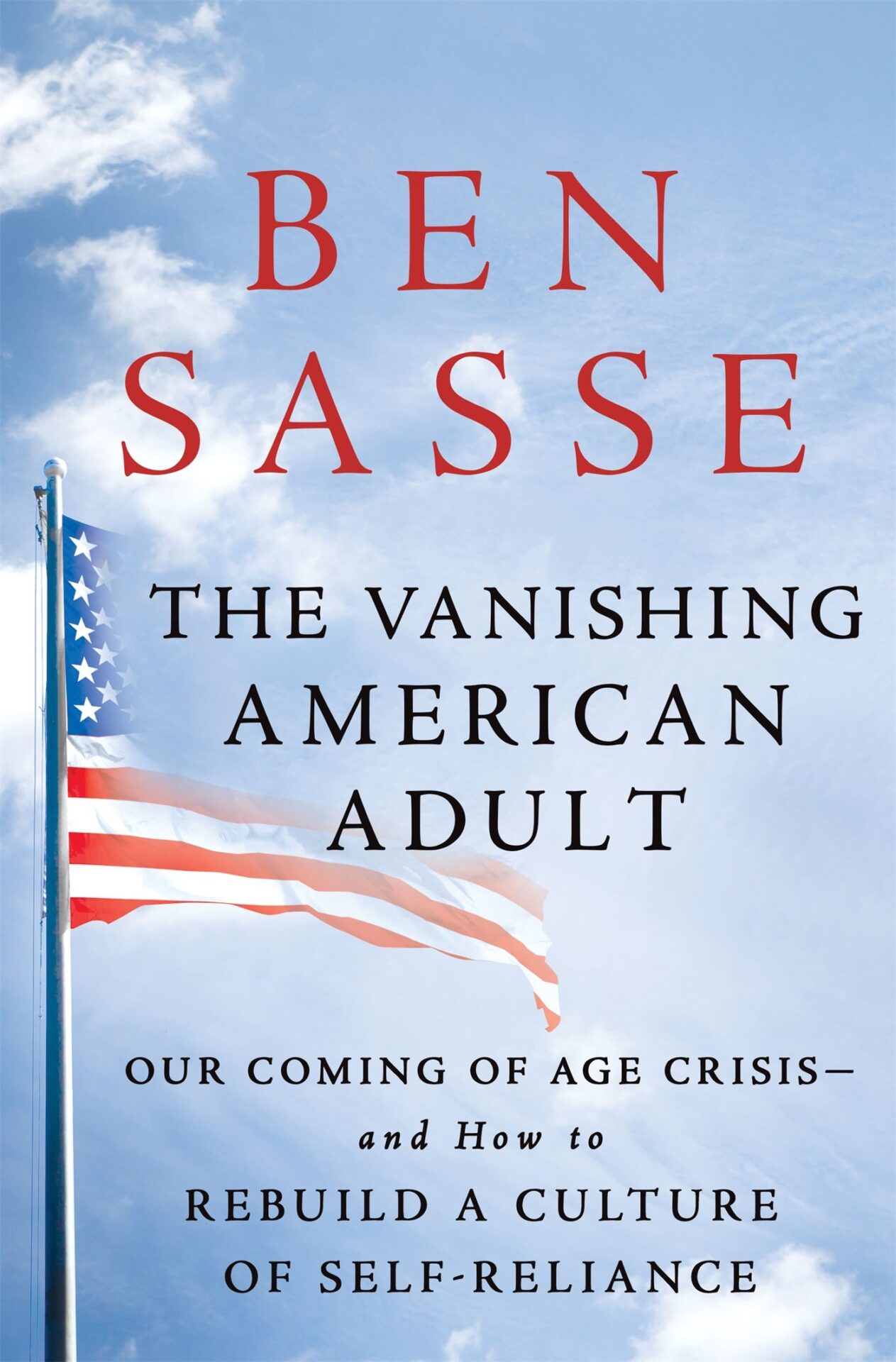
As the new school year kicks into gear, my thoughts turn to education, learning, and how best to serve my kids’ needs. Their schooling is constantly on my mind – Are they in the right classroom/school? Are they learning the right things? Are they advancing well enough?
Yet this pressure I put on myself is not just to help them excel at academics and learning (to one day be contenders in an ever-competitive college application process), but also to help them excel at being adults.
And being an adult is hard: there is no instruction manual for how to be a good one. I still struggle with this. Am I doing this all “right”?
When Ben Sasse’s book was put into my hands, it was an interesting opportunity to try to put real tasks to how to be an adult, and how to raise kids to be good adults, that I loved.
*Please note that there are affiliate links in this post. Thanks for your support!*
To be forthright, Ben Sasse’s book The Vanishing American Adult: Our Coming-of-Age Crisis–and How to Rebuild a Culture of Self-Reliance is not really meant to be a manual on how to be an American adult. He wrote it to encourage us to raise the youth of today to be the responsible adults and American citizens that tomorrow needs.
But the book makes me wonder, has Sasse just given up on the current state of American adults? He is washing his hands clean of the current adult population and going for the next ones – trying to get ’em while they are young.
But there is a lot in Sasse’s book which the current band of American adults should begin to implement in their own lives. And I believe it isn’t too late.
To buy into Sasse’s book, you have to fundamentally believe there is a problem in America. I think we all acknowledge a problem (anger, divide, inequity, injustice), we just don’t agree on what the problem is.
Sasse comes at his book with all of his background as a historian, conservative, and college president. It is a book that is an easy read if you are accustomed to the long, meandering, vocabulary-heavy sentences (it took me back to my days as an English major). But under his historian lens, Sasse details how we stopped being a nation of hard-working, Puritanical rebels who relished being American and became languid, relatively unread adults who live in excess and don’t appreciate what we have. That may be an extreme way of putting his premise, but it’s there.
Sasse believes that we are becoming a nation of uninvolved consumers rather than like the original founders, like Ben Franklin, who lived with a dream and a robust set of nothing but chutzpah to get there.
Is this accurate?
Sasse is clear that he isn’t trying to write a policy book (although he kind of is) but rather help Americans get on the same page as to what the problem with our currently fractured and increasingly angry society is. He puts forth a position that we still have the ability to mold the teenagers of today into the mature and responsible adults we want to leave our country to. Mature and responsible adults who will do more with it than we have, perhaps?
It is not arguable that America as a whole has become incredibly wealthy (an assessment of the distribution of that wealth is not for this post – but overall, Americans are pretty well off compared to other countries). We have also become consumers that exist in a disposable culture. We expect people to fix things for us, which gives an air of entitlement to our daily lives.
I worry about America, beyond politics. This applies to the way I feel we “speak” with our money, our stewardship of the Earth, our responsibility and sense of control over the decisions we make. Sure, some things affect us, but we always have decisions to make about the people we want to be, the mark we want to leave, and how we spend our time and energy.
Our dollars, our work time, our nutrition, our free time, our screen consumption – we make decisions every moment of our lives. We need to own who we are.
So Sasse digs into how he thinks we can keep today’s teenagers from falling prey to an America that scares him.
His action-items are:
Flee age segregation.
We all exist in age-defined spheres (children and teenagers especially) – classrooms, sports, extracurricular activities are all divided by age. While that may make sense developmentally, it doesn’t make sense for true growth. If children are to understand aging and the fragility of human life, they need to be exposed to all different parts of the human life cycle. Hiding aging isn’t healthy, he argues. How can you grapple with the meaning of life if you never have to face the fact that life ends?
Embrace work pain.
Sasse, in one of my favorite moments, describes that there is a difference between recreation and leisure. In our society, Americans currently have more leisure time than ever. He also distinguishes between “eulogy virtues” versus “resume virtues,” which I loved.
Consume less.
I will let him speak:
Living the good life doesn’t require the budding adult to live without goods, without things, without stuff. But a truly good life is incompatible with a dependency on such things. At the very least, maturation requires imagining a life without material wealth, resolving that we could be happy in such a state, and actually experiencing what mild deprivation is like from time to time.
Sasse also writes:
If the unexamined life is not worth living, neither is a life of passive material appetites…Don’t announce that you’re the kind of person who cannot do X or Y or who cannot sleep easily out of your own bed. Rather, resolve to become the kind of person who can do X and Y, and can sleep easily, flexibly, wherever the opportunity arises …
Consumption doesn’t make us happier. So what does? He isn’t eschewing well-earned wealth (he is Republican with a capital R after all), but sees that in America we buy for buying’s sake, and where does that get us?
Travel to see.
One of the best ways to become secure in your adulthood, in your independence and self-assertiveness, is to learn to disentangle nature from culture. The culture you live in may be more or less healthy. But how will you know until you’ve experienced cultures other than your own?
This is my heart. I tell friends at cocktail parties and readers on this website, if they want to listen or tune in, that every American should be forced to live abroad for at least six months. There is no replacing that experience with book education.
Build a bookshelf.
I like this because I believe that books and printed words are infinitely more powerful than any online article at all. Period. This comes from my own experience as well as watching my children. Yet we have turned away from the consumption of books (especially tomes of historical knowledge that aren’t under the celebrity book club umbrella). Sasse argues we need to get back to this.
Among the responsibilities of each citizen in a participatory democracy is keeping ourselves sufficiently informed so that we can participate effectively, argue our positions honorably, and, hopefully, forge sufficient consensus to understand each other and then govern. To this end, our critical faculties must be in top condition — the ability not just to evaluate sources, weigh evidence, and check facts, but also to understand motivations, resolve apparent contradictions, cut through ambiguities, and maybe even discover truths.
And paragraphs like this challenge me, as a current American adult, to fall in love with America again, recalling its grand history, and to ask what can I do to be a better American?
Sasse makes some broad sweeping generalizations that many would chafe at. There are hard-working Americans who don’t have the resources to engage in some of these action items. And at times I wondered if Sasse was too removed from average American life to understand what he was asking.
But isn’t it all worth striving for anyhow? A diverse bookshelf is cheaper than the new iPhone X, after all. Travel has become moderately affordable for many Americans if you can just get in your car and pitch a tent. Maybe, again, it’s about decisions.
While I love the challenge that this entire book offers to teenagers (to get off the screen, stop being defined by a consumer culture that wants their income and wants to define them, and so on) these are also things that grown-ups can do.
Perhaps it is time we all took Sasse’s lessons and engaged in the action items he thinks are needed to be responsible and useful citizens of the best experiment of all time: America. Maybe we make America great again not by electing one particular person, but by starting with ourselves and making ourselves great Americans again.
We never stop changing, growing, learning and using opportunities to better ourselves. So instead of looking outward or at the next generation, maybe we look inside.
Get your copy today:

Last Updated on August 15, 2019 by Mrs. Family Trip

